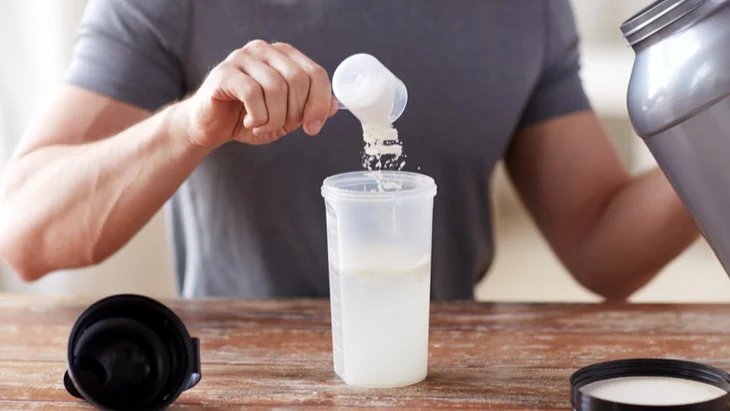Protein powders can be a great way to supplement your diet and active lifestyle.
Yet, with all the protein powder options out there, how do you know which is the best? In this article, we’ll take a look at the benefits of adding protein to your diet and the things to look for when picking the best protein powder for your needs.
Why you should consider adding protein powder to your diet
Protein powders are a quick, easy way to enjoy nutrients on the run. Protein is a building block for the human body and protein shakes are a popular choice, as they are convenient and help individuals get enough protein to meet their fitness goals.
Protein is an essential macronutrient that can aid in:
- Muscle recovery
- Weight loss
- Promoting muscle growth
- Improving sports performance
- General nutrient replenishment.
With so many choices out there, how do you pick the best protein powder for you? It may depend on your fitness goals.
Find the right protein powder for your lifestyle
When researching which protein powder suits you, it’s best to start with your lifestyle. There is no magic protein powder that’s perfect for one specific goal, such as weight loss over muscle growth. It all comes down to the ingredients and ratios of protein to carbs and sugars. A personal trainer or nutritionist can be a great help in matching you with the right protein powder for your fitness goals.
Looking at lifestyle factors, such as if you follow a vegan diet or are lactose intolerant may lead you to one of the many emerging vegan proteins on the market. Plant-based proteins have exploded in popularity in recent years, giving people more options for their protein shakes.
Choose a core protein source
1. Whey protein powder
Whey protein is one of the most well-known forms of protein powder out there, as a complete protein. It’s derived from the liquid that separates from the milk curds during the cheesemaking process. While it’s low in lactose, it’s not lactose-free, which can make it difficult for some people to digest.
Whey protein is rich in branched-chain amino acids (BCAAs), which is three of the nine essential acids: leucine, isoleucine and valine. Thanks to its BCAA content, whey protein is quickly digested and may reduce appetite, promote fat loss and increase muscle mass and strength.
If you are not vegan or lactose-intolerant, this could be an excellent option for you.
2. Pea protein powder
Pea protein powder is a popular option among vegans, vegetarians, and people with allergies. Derived from the yellow split pea, it’s a high-fibre legume that packs all but one essential amino acid.
Pea protein may promote fullness, is hypoallergenic and rich in high-quality protein and iron. It can aid muscle growth, heart health and weight loss.
3. Hemp protein powder
Hemp protein is arguably the best plant-based protein powder option, as it’s a complete protein. Hemp protein powder is made by grinding pressed hemp seeds into a fine powder. Known for its nutty, earthy taste, hemp is a high-quality plant protein with all nine essential amino acids, as well as fibre, minerals and healthy fats.
Some people love the taste of hemp protein, while others find it too strong, so it’s worth giving it a try in a small amount before buying in bulk. Hemp protein is easily digestible but start small – your gut may not be used to such high doses of fibre.
4. Soy protein powder
Soy protein isolate powder is low in fat, contains no cholesterol, and is a complete protein. Soy protein powder is made by defatted soy flour, with fibre but without the water-soluble carbohydrates. It enhances the muscle protein synthesis process; however, some studies show that it’s less effective than whey protein for building muscle.
Soy protein can be of great benefit when combined with other proteins.
5. Brown rice protein powder
Brown rice protein is a popular option for vegans and is hypoallergenic, which is generally considered suitable for people with lactose, soy and gluten allergies.
Brown rice powder is extracted from the grain by separating carbs and protein with enzymes. It has a subtle flavour that can be easily added in with other powders or in your shake. It has a low-glycemic index, which can help regulate blood sugar levels.
Brown rice protein powder has all nine amino acids but is low in lysine, which plays a crucial part in muscle turnover and growth. We suggest looking out for a protein powder blend that makes up for the low levels of lysine – for more bang for your buck.
What to look for when choosing your protein powder
When researching the best protein powder for you, keep an eye out for the ingredients, such as natural and artificial sweeteners. You’ll also want to be wary of the carb intake and any other artificial ingredients you may not want.
Find a flavour you’ll enjoy
Every protein powder has a unique taste, depending on the protein source and ingredients. The standard line-up includes chocolate, strawberry and vanilla – but many companies use flavour enhancers to produce artificial flavours. You can find wacky flavours like rocky road and salted caramel, or go completely natural with a non-flavoured option. Be sure to read the ingredients to ensure you understand what you’re drinking and the potential side effects.
To improve the taste of your protein shake, you can add milk (dairy or non-dairy), to give it a creamier texture or add in some fruit or peanut butter. Discover 6 additions you can add to your morning blend.
Want to learn more about nutrition?
If you have any questions about nutrition and fitness, our personal trainers are more than happy to help. Whether you’re already a member at our fitness club or are considering joining, we’d love to hear from you. Contact us today.

